I appreciate the concern many constituents have raised about the distressing situation in Israel and Gaza. The conflict has resulted in significant human suffering. The loss of innocent lives, including children, is deeply concerning as is the hostage situation and the atrocities committed by Hamas on October 7. This is an intergenerational trauma in the making for Gazans and Israeli's including the non-resident nationals caught up in this conflict.
The immediate response
On 16 October 2023, the following motion was moved by the Albanese Government and passed with Coalition support:
That the House—
(1) unequivocally condemns the attacks on Israel by Hamas, which are the heinous acts of terrorists, and have encompassed the targeting and murder of civilians, including women and children, the taking of hostages, and indiscriminate rocket fire;
(2) stands with Israel and recognises its inherent right to defend itself;
(3) condemns antisemitism and recognises that generations of Jewish people have been subjected to this hateful prejudice;
(4) calls for the immediate and unconditional release of all hostages;
(5) recognises that Hamas does not represent the Palestinian people, nor their legitimate needs and aspirations;
(6) acknowledges the devastating loss of Israeli and Palestinian life and that innocent civilians on all sides are suffering as a result of the attacks by Hamas and the subsequent conflict;
(7) supports justice and freedom for Israelis and Palestinians alike;
(8) supports international efforts to establish and maintain humanitarian access into Gaza, including safe passage for civilians;
(9) reiterates Australia's consistent position in all contexts is to call for the protection of civilian lives and the observance of international law;
(10) supports Australia's engagement with countries in the Middle East and beyond, at all levels, in support of the protection of civilians, and the containment of the conflict;
(11) supports the Government's ongoing efforts to provide consular assistance to affected Australians and to facilitate the departure of those who want to leave the region;
(12) acknowledges what has unfolded is deeply distressing for many in the Australian community, close to the heart of many, and it is important that we maintain respect for each other here at home as people express their views;
(13) condemns all forms of hate speech and violent extremist activity, including Antisemitism and Islamophobia;
(14) recognises an attack on any religion is an attack on all religions and that we all share a responsibility to unite, condemn and defeat such an attack on our common values and way of life;
(15) notes that undermining social cohesion and unity by stoking fear and division risks Australia's domestic security; and
(16) affirms in the strongest possible terms that hateful prejudice has no place in Australia.
I delivered a speech on this motion at the time, sharing my thoughts on the situation and our own responsibilities as Australians.
This speech was informed by my visit to Israel in July on a historic multipartisan delegation with the Speaker. I met with Israeli authorities, think tanks, NGOs, UN representatives - including Tom White of UNRWA and Lyn Hastings of the UN - civilians and visited the West Bank hearing from the Palestinian Prime Minister as well as visiting a Palestinian hospital near Jerusalem which caters for children, adolescents and adults. It was an immersive experience that gave me some insight into the perspectives from all sides and the key players including the nation states involved. I realised just how complex this conflict truly is.
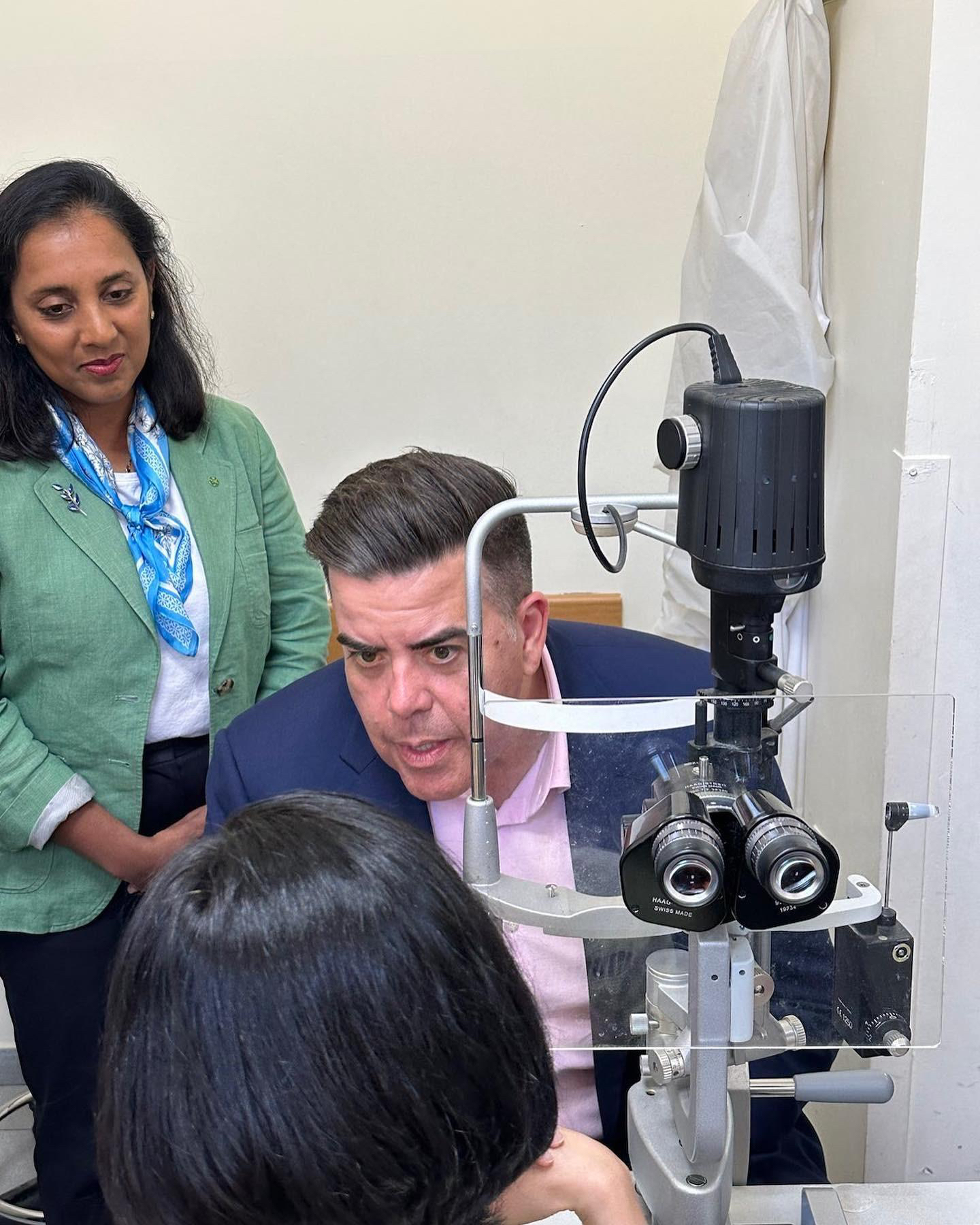
St John's Eye Hospital in East Jerusalem.
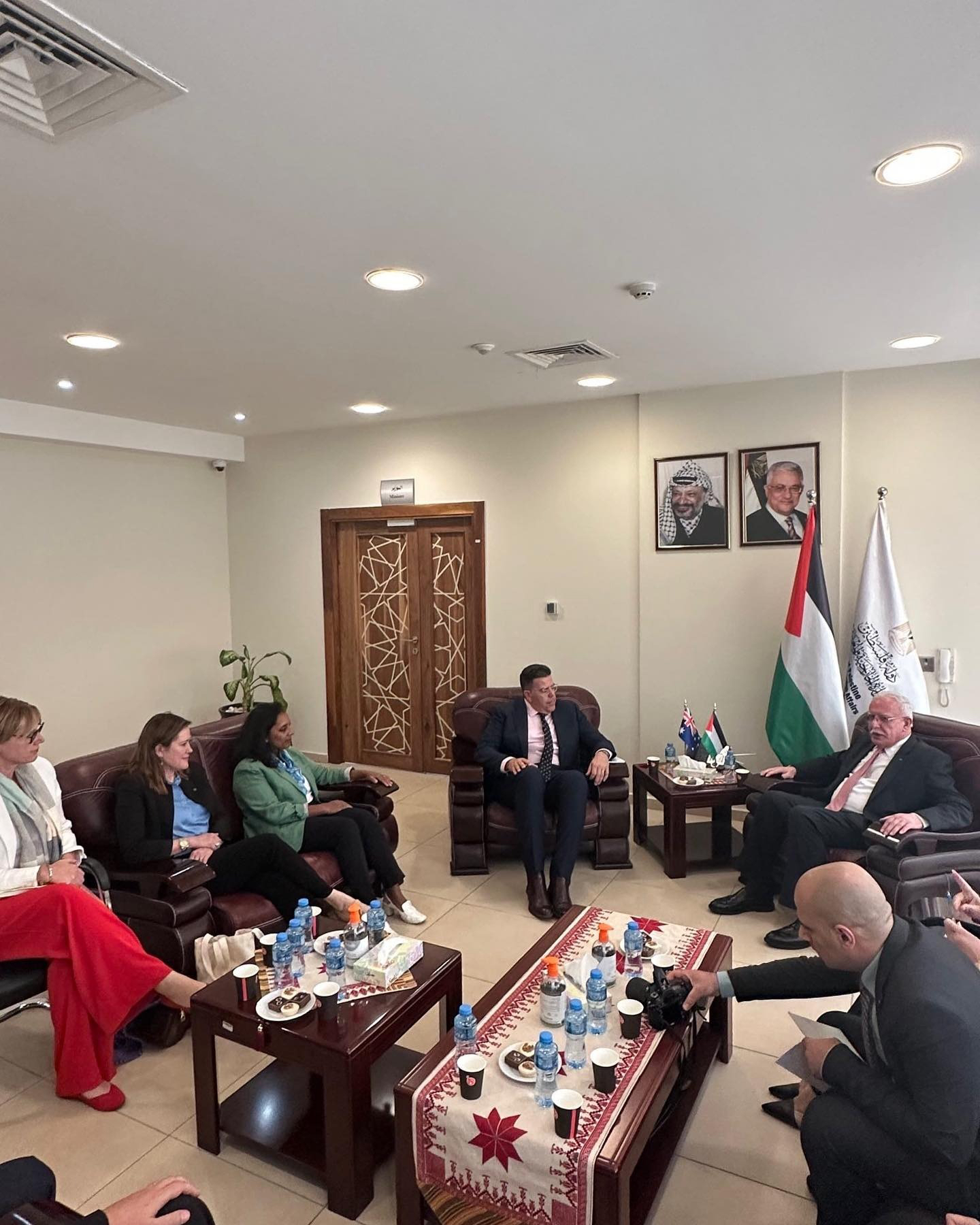
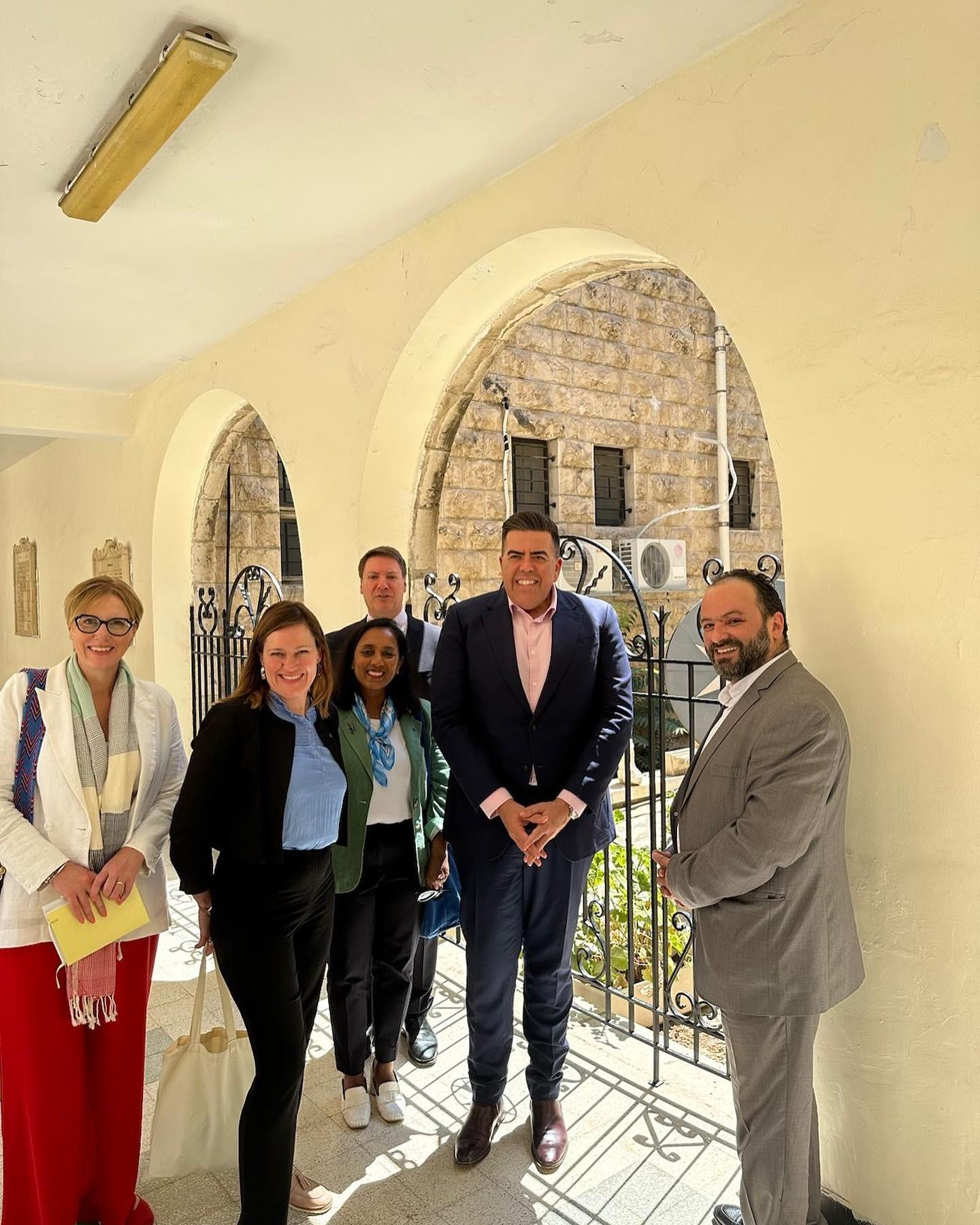
I returned to Israel in a bipartisan delegation accompanied by my colleague Josh Burns MP at the start of December. This trip was sponsored by AIJAC and included discussions with the Israeli Foreign Ministry and Palestinian Authority, as well as firsthand testimony from victims of the October 7 attacks. Unfortunately, travel to the West Bank and Gaza was not possible due to security issues.
I was exposed to the devastating impact of this conflict on civilians, particularly Palestinians in Gaza and the West Bank, as well as Jewish and Arab Israelis in the southern and northern communities of Israel. Experts stressed the risk of a regional escalation, given the involvement of Iranian proxies, including Hezbollah, Houthi rebels and Palestinian Islamic Jihad.
I took the opportunity to have frank discussions without the filter of mainstream or social media, asking difficult questions about Israel’s response. Everywhere I went, I met with people who were deeply committed to achieving an enduring and lasting peace in the region.
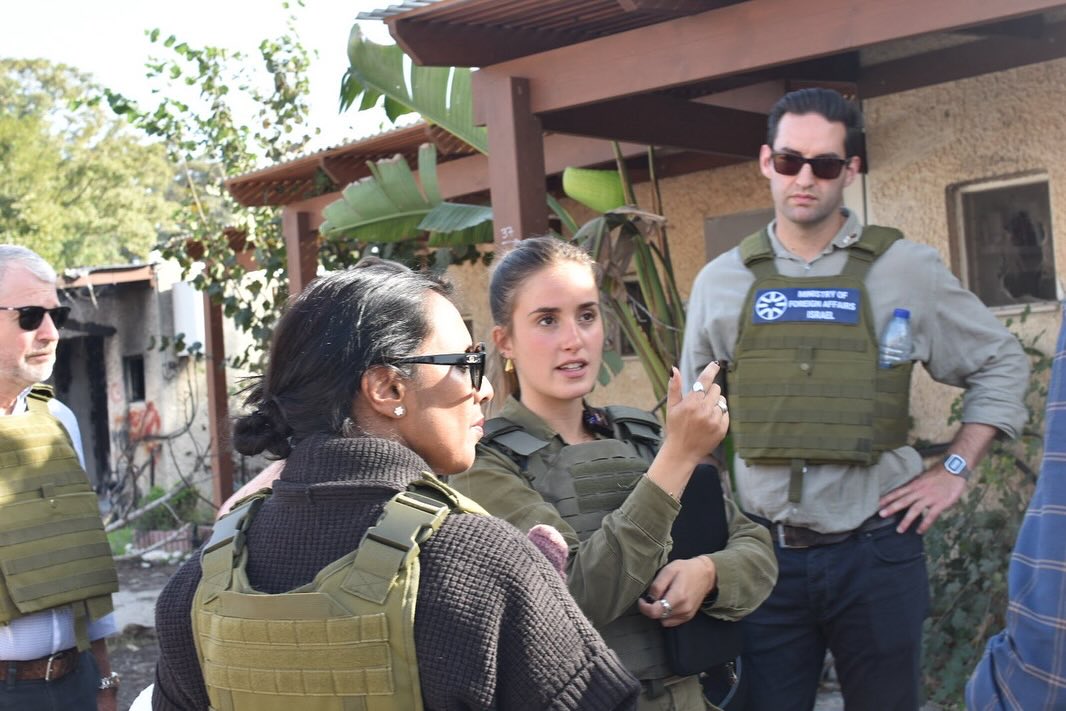
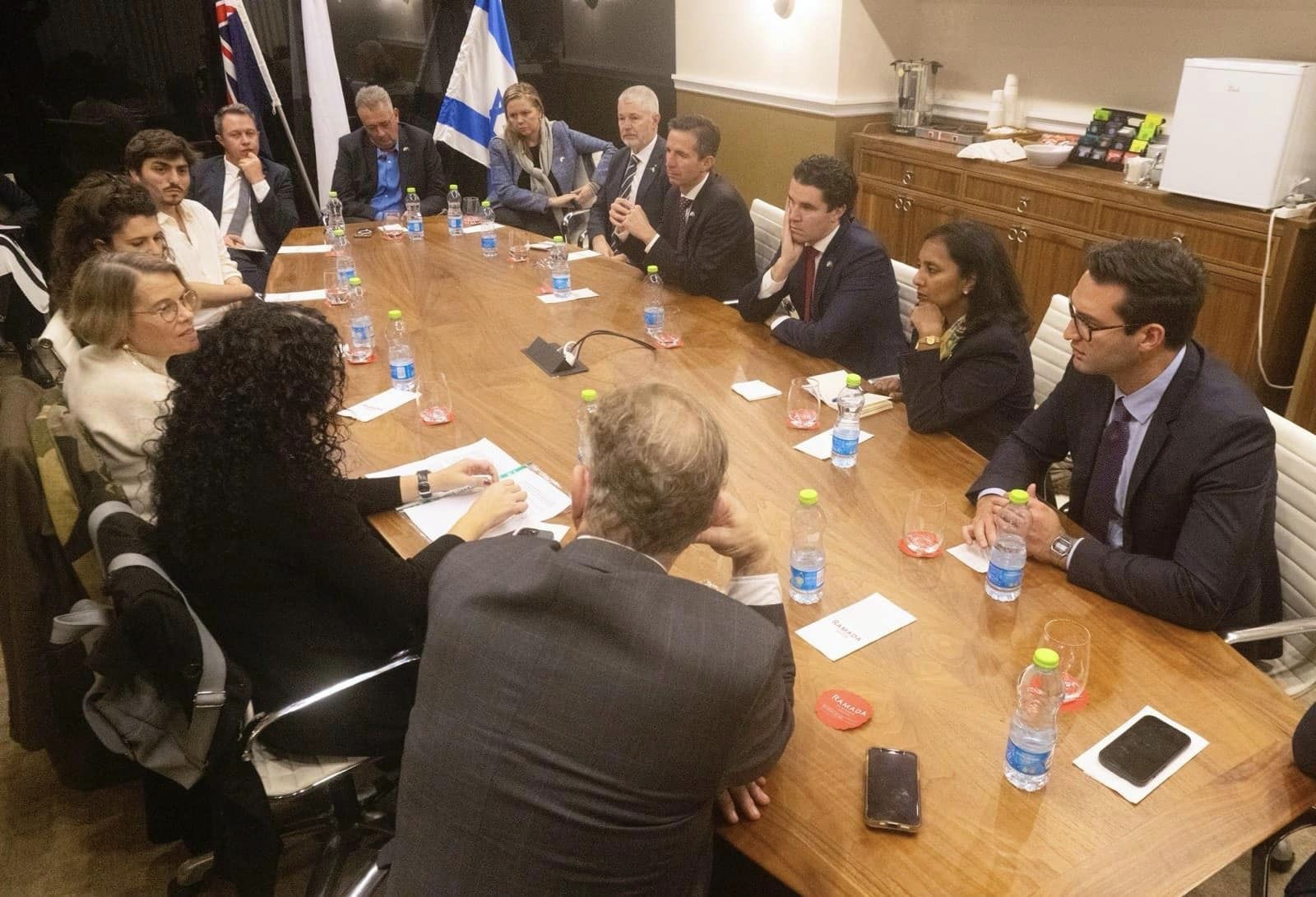
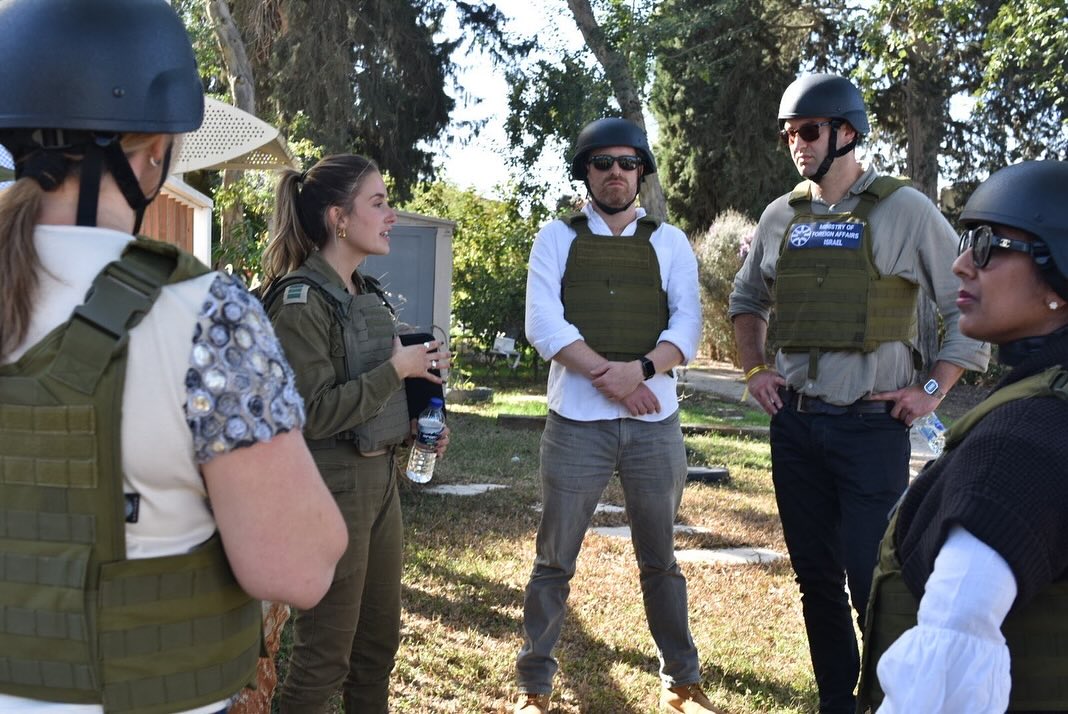
This widespread human suffering means the need for a just and enduring peace has rarely been more pressing. The future for both Israelis and Palestinians depends on this being realised.
The status quo is failing everyone.
Our priorities
Australia has five core priorities in this crisis:
- Protecting and supporting civilians
- Preventing conflict from spreading
- Assisting Australians abroad
- Keeping our country unified
- Reinforcing the need for a durable peace
Protecting and Supporting Civilians
Some 1,200 Israelis were killed by Hamas on 7 October, the biggest loss of Jewish life on any day since the Holocaust. We condemn these terrorist attacks unequivocally: they cannot and should not be justified. The atrocities committed by Hamas plumbed new depths of depravity to a level that I cannot repeat here. How innocent people in Israel were killed also matters because it provides some insight into the scale of the response. With close to 135 people still held captive, we call for Hamas to immediately and unconditionally release all hostages.
With grief and anger engulfing communities across the region, the promise of peace and security – for Israelis and Palestinians alike – recedes even further.
Food, water, medicine, fuel and other essential assistance must reach people in desperate need, and civilians – including Australians – must be able to get to safety.
We continue to call for safe, unimpeded and sustained humanitarian access and we are doing what we can to support the countries and other bodies working to achieve this outcome.
In affirming Israel’s right to defend itself, Israel’s friends - including Australia – have consistently emphasised that the way it does so matters. We know it is extremely difficult to defeat a craven terrorist group that has burrowed itself into civilian infrastructure, using civilians as a shield.
Like Australia, Israel is a democratic nation state, pledged to the rule of law. The standards democracies seek and accept are high.
So when Israel’s friends urge Israel to exercise restraint and protect civilian lives, it is critical that Israel listens. It matters for innocent civilians, who should not pay for horrors perpetrated by Hamas. And it matters for Israel’s own security, which faces grave risk if conflict spreads. The international community will not accept ongoing civilian deaths.
Australia welcomes the agreement brokered by Egypt, Qatar and the US which saw a pause in hostilities and the release of hundreds of hostages by Hamas.
Preventing the Conflict from Spreading
Australia also remains deeply concerned about potential escalation in Lebanon.
We have also seen troubling escalation in the West Bank, including a rise in settler violence. On 15 December 2023, the Australian Government joined with 13 other countries and the European Union to condemning the attacks by extremist settlers and the lack of action taken to protect Palestinian civilians and prosecute aggressors.
Australia, Belgium, Canada, Denmark, the European Union, Finland, France, Ireland, Luxemburg, the Netherlands, Norway, Spain, Sweden, Switzerland, and the United Kingdom express their grave concern about the record number of attacks by extremist settlers against Palestinians in the West Bank. Since the start of October, settlers have committed more than 343 violent attacks, killing 8 Palestinian civilians, injuring more than 83, and forcing 1026 Palestinians from their homes.
We strongly condemn the violent acts committed by extremist settlers, which are terrorising Palestinian communities. We reiterate our position that Israeli settlements in the occupied West Bank are illegal under international law and remind Israel of its obligations under international law, in particular Article 49 of Geneva Convention IV.
This rise in extremist settler violence committed against Palestinians is unacceptable. Israel, as the occupying power, must protect the Palestinian civilian population in the West Bank. Those responsible for the violence must be brought to justice. Israel’s failure to protect Palestinians and prosecute extremist settlers has led to an environment of near complete impunity in which settler violence has reached unprecedented levels. This undermines security in the West Bank and the region and threatens prospects for a lasting peace.
While we welcomed the Government of Israel’s statement on this issue on 9 November where it conveyed that action would be taken against violent perpetrators, proactive steps must now be taken to ensure the effective and immediate protection of Palestinian communities. Words are important but must now be translated into action.
Assisting Australians Abroad
About 2,000 previously registered Australians have now left Israel and the Occupied Palestinian Territories. We continue to repatriate Australians out of Gaza. These people were met by DFAT officials in Egypt, who supported them including with accommodation and onwards travel, free of charge. We have also facilitated the departure of Australians and their families from the West Bank to Jordan.
Despite this progress, it remains extremely difficult to get people out of Gaza. We continue to press for the remaining Australians and their family members to be allowed to depart as soon as possible. We know this remains a very distressing situation for Australians in Gaza and their families at home.
Keeping our Country Unified
The number of Australians across the region underlines how close to home this conflict is. I have spoken with people who have lost loved ones or who have relatives being held hostage on 7 October, as well as people who have lost loved ones in Gaza.
As Australians who cherish our peaceful community and aspire to ever greater unity as a nation, we mourn every innocent life which has been lost in this conflict.
Australian communities are in pain, felt most acutely in Jewish and Palestinian communities. There is a long, complex and disputed history – unfathomable trauma – deeply felt; close to the heart of many.
We understand that there will be individuals and families in Australia who are personally and deeply affected by this conflict. The lived experiences of our different Australian communities are distinct and valued equally. It is important that we express our views with respect and understanding for difference. We must all reject hate and condemn prejudice and discrimination in all its forms.
Reinforcing the Need for a Durable Peace
We believe in the importance of affirming Israel’s right to exist without denying the longstanding and legitimate aspirations of the Palestinian people – including to statehood – aspirations Australia supports.
Demand is growing among the international community – west, east, north and south – for a political process. Australia is part of the international diplomatic effort reinforcing the imperative of a durable peace.
It is not possible to assure the interests of Israelis without also assuring the same for Palestinians.
A durable peace calls for people to see each other’s humanity. It requires all sides to respect the right of others to exist.
It will require the dismantling of Hamas – which does not represent the Palestinian people - and a reformed, legitimate Palestinian Authority that disavows violence.
On 13 December 2023, the Prime Minister released a joint statement with the Prime Ministers of Canada and New Zealand:
Australia, Canada, and New Zealand mourn every Israeli and Palestinian innocent life which has been lost in this conflict and express our condolences to all families and communities affected by the violence.
We unequivocally condemn Hamas’ terror attacks on Israel on October 7, the appalling loss of life, and the heinous acts of violence perpetrated in those attacks, including sexual violence. We condemn Hamas’ unacceptable treatment of hostages and call for the immediate and unconditional release of all remaining hostages.
We recognise Israel’s right to exist and right to defend itself. In defending itself, Israel must respect international humanitarian law. Civilians and civilian infrastructure must be protected. We are alarmed at the diminishing safe space for civilians in Gaza. The price of defeating Hamas cannot be the continuous suffering of all Palestinian civilians.
We remain deeply concerned by the scale of the humanitarian crisis in Gaza and ongoing risks to all Palestinian civilians. Safe and unimpeded humanitarian access must be increased and sustained.
The recent pause in hostilities allowed for the release of more than 100 hostages and supported an increase in humanitarian access to affected civilians. We acknowledge the persistent diplomatic efforts of the United States, Qatar, and Egypt to broker this pause, and we regret it could not be extended.
We want to see this pause resumed and support urgent international efforts towards a sustainable ceasefire. This cannot be one-sided. Hamas must release all hostages, stop using Palestinian civilians as human shields, and lay down its arms.
There is no role for Hamas in the future governance of Gaza.
We support Palestinians’ right to self-determination. We oppose the forcible displacement of Palestinians from Gaza, the re-occupation of Gaza, any reduction in territory, and any use of siege or blockade. We emphasize that Gaza must no longer be used as a platform for terrorism. We reaffirm that settlements are illegal under international law. Settlements and settler violence are serious obstacles to a negotiated two-state solution.
We recommit ourselves to working with partners toward a just and enduring peace in the form of a two-state solution, where Israelis and Palestinians can live securely within internationally recognised borders.
We remain concerned about the impact of the conflict spilling across the region and urge all governments in the region to work towards containing the conflict. We call on the Houthis to cease immediately their attacks on international shipping and crew operating in the Red Sea.
We condemn rising antisemitism, Islamophobia, and anti-Arab sentiment in our countries and around the world and remain firmly committed to combatting prejudice, hatred, and violent extremism.
On 15 February 2024, the Prime Minister released an updated joint statement with the Prime Ministers of Canada and New Zealand on the Israel's planned military operation in Rafah:
The Prime Ministers of Australia, Canada and New Zealand today issued the following statement on reports of Israel's planned military operation in Rafah.
We are gravely concerned by indications that Israel is planning a ground offensive into Rafah. A military operation into Rafah would be catastrophic. About 1.5 million Palestinians are taking refuge in the area, including many of our citizens and their families. With the humanitarian situation in Gaza already dire, the impacts on Palestinian civilians from an expanded military operation would be devastating. We urge the Israeli government not to go down this path. There is simply nowhere else for civilians to go.
There is growing international consensus. Israel must listen to its friends and it must listen to the international community. The protection of civilians is paramount and a requirement under international humanitarian law. Palestinian civilians cannot be made to pay the price of defeating Hamas.
An immediate humanitarian ceasefire is urgently needed. Hostages must be released. The need for humanitarian assistance in Gaza has never been greater. Rapid, safe and unimpeded humanitarian relief must be provided to civilians. The International Court of Justice has been clear: Israel must ensure the delivery of basic services and essential humanitarian assistance and must protect civilians. The Court's decisions on provisional measures are binding.
We are clear that a sustainable ceasefire is necessary to finding a path towards securing lasting peace for Israelis and Palestinians. Any ceasefire cannot be one sided. Hamas must lay down its arms and release all hostages immediately. We again unequivocally condemn Hamas for its terror attacks on Israel on October 7.
Ultimately, a negotiated political solution is needed to achieve lasting peace and security. Australia, Canada, and New Zealand remain steadfast in their commitment to a two-state solution, including the creation of a Palestinian state alongside Israel, where Palestinians and Israelis live side by side in peace, security, and dignity.
It will require serious international investment in the Palestinian economy, so Palestinians can build a future for themselves.
And it will require Israel to stop establishing settlements in the Occupied Palestinian Territories - that even the divided UN Security Council agreed is a “flagrant violation” of international law and a “major obstacle” to peace. Settler violence against Palestinians must cease and perpetrators held to account.
Ultimately, a just and enduring peace requires a two-state solution. An Israeli state alongside a Palestinian state. Israelis and Palestinians living securely and prosperously within internationally recognised borders.
The hopes for peace and security for Israelis and Palestinians will recede even further if today’s generations are motivated by anger and resentment resulting from this crisis.
The international community must work together to chart a path out of this crisis, towards a political process. That political process must end in a just and enduring peace, in the form of a two-state solution where Israelis and Palestinians can live securely behind internationally recognised borders.
This will need to see all sides respect the right of the other to exist. It must see the removal of terrorist group Hamas. It must deliver the legitimate aspirations of Palestinians for statehood.
Funding Initiatives
Humanitarian Aid to Gaza
On 14 October, Foreign Minister Wong announced $10 million in humanitarian assistance civilians affected by the conflict in Gaza, including:
- $3 million to the International Committee of the Red Cross to fund urgent needs like restoring essential services and providing medical support to victims
- $7 million through UN agencies to deliver critical support including emergency water, nutrition, sanitation and hygiene services, as well as child protection
On 26 October, Foreign Minister Wong announced that Australia would provide an additional $15 million in humanitarian assistance for civilians affected by the conflict in Gaza, including:
- $6 million for the Red Cross and Red Crescent Movement to provide life-saving assistance including food, water and medical care.
- $2 million to UNICEF for the provision of emergency water, sanitation and hygiene services.
- $2 million to UN agencies to preposition supplies and to support those who have been displaced by the conflict.
- $2 million to UNFPA to provide urgent women’s health services.
- The remainder will be provided to trusted partners to address emerging needs.
On 17 November, Foreign Minister Wong announced an additional $21.5 million in humanitarian assistance to the Middle East, including in response to the urgent and ongoing humanitarian needs resulting from the Hamas-Israel conflict. This funding will be directed to conflict affected populations in the Occupied Palestinian Territories and to address the ongoing regional refugee crisis, with a focus on women and children. This package includes:
- $4 million to the Red Cross and Red Crescent Movement to continue delivering urgent and emergency services and supplies.
- $6 million through the United Nations Relief and Works Agency (UNRWA), to provide urgent lifesaving assistance including food, shelter and emergency health care
- $11.5 million to refugee programs in Lebanon and Jordan, at this time of increasing regional instability.
On 12 June 2024, Foreign Minister Wong announced an additional $10 million in humanitarian assistance to address urgent needs in Gaza. The funding will be directed to the World Food Programme to provide life-saving food assistance to civilians in Gaza facing the risk of famine.
Since 7 October, Australia has committed $72.5 million in humanitarian assistance to reinforcing Australia’s longstanding commitment to addressing the essential needs in Gaza and respond to the protracted refugee crisis in the region.
Temporary Pause on UNRWA Funding Lifted
In January, Australia joined the US, Britain, Canada, Germany, Italy, the Netherlands, Switzerland, Finland, Estonia, Japan, Austria and Romania in temporarily pausing additional funding for UNRWA in light of serious allegations that UNRWA staff were involved in the Hamas terrorist attacks on 7 October. Australia welcomed the decision by UNWRA to dismiss the relevant staff and launch an immediate investigation. I gave an interview on this matter at the time.
Australia has now lifted its temporary pause on funding for the United Nations Relief and Works Agency (UNRWA), following steps to strengthen the integrity of UNRWA operations.
We are also supporting humanitarian air drops and providing urgent help to UNICEF and the Humanitarian and Reconstruction Coordinator for Gaza.
The Australian Government has been working with a group of donor countries and with UNRWA on the shared objective of ensuring the integrity of UNRWA’s operations, rebuilding confidence and ensuring aid flows to Gazans in desperate need. We see this as an ongoing process of diligence and vigilance.
In disbursing the $6 million to UNRWA’s flash appeal, Australia is finalising an updated funding agreement that will include stringent conditions such as guarantees of staff neutrality, and confidence in supply chains.
These steps provide the necessary confidence that the $6 million in urgent humanitarian funding to be released will go directly to those in need, satisfying Australia’s rigorous humanitarian controls, sanctions and legal requirements.
Australia’s decision to release the pause is in line with steps taken by Canada, Sweden and the EU. It is expected that more countries that have paused will take a similar approach.
UNRWA must continue to do all it can to ensure the highest standards of governance and accountability are met, as its work is vital. There can be no tolerance for members of terrorist organisations working for UNRWA.
Only UNRWA has the infrastructure to receive and distribute aid on the scale needed right now in Gaza. We urge Israel to recognise its mandate and work transparently to support its integrity. In resuming funding, the Government is responding to a humanitarian situation in Gaza which is dire, and only worsening.
Domestic Investment
Domestically, we fast tracked $50 million towards securing faith-based institutions including Jewish and Islamic community organisations. We have also dispensed $25 million each to the Executive Council of Australian Jewry and the Australian Palestinian, Muslim and other communities affected by this conflict.
In addition, the Albanese Government will fund a series of other measures to support the Australian community, including:
- $3 million over two years for targeted mental health and community wellbeing support services to address psychological harm and community distress. The support will be delivered through the Program of Assistance for Survivors of Torture and Trauma and targeted Primary Health Networks.
- $6 million for mental health and wellbeing support to students in Jewish and Islamic schools and students of Jewish and Islamic faith in government schools, recognising the impact of the conflict on young people in these communities.
- $12.8 million over four years to protect Australians from terrorist and violent extremist online content, including support for a 24/7 online crisis response capability in our region, enhancing our domestic online monitoring and referral capability and providing the eSafety Commissioner additional resources to receive and respond to referrals of abhorrent content, especially out of hours.
Tackling Hate
On December 6 2023, the Parliament passed the Albanese Government’s legislation that criminalises the Nazi salute and the public display of and trade in Nazi hate symbols. The Bill passed with unanimous support, sending a clear message there is no place in Australia for acts and symbols that glorify the horrors of the Holocaust and terrorist acts.
This is the first Commonwealth legislation of its kind and will ensure no one will be allowed to glorify or profit from acts and symbols that celebrate the Nazis and their evil ideology.
The Nazi salute and hate symbols are widely recognised and used to promote hate, recruit followers and convey messages of violence. It is utterly unacceptable that there have been incidents of their use in Australia.
The Bill ensures that glorifying and praising acts of terrorism are criminal offences under Commonwealth law, and increases the penalties for those seeking to glorify such atrocities. The Bill also criminalises the use of a carriage service for violent extremist material, tackling the rise of violent radicalism proliferating online and enabling law enforcement to intervene in the spread of violent, hateful propaganda.
Australia is a proudly multicultural nation where everyone should be able to live without fear of discrimination. We must promote and support respect, acceptance and understanding across the Australian community.
Since the conflict began, we have seen the increasing use of online platforms to harm people through practices like doxing – the malicious release of personal information without permission.
The Albanese Government takes the protection of Australians’ privacy and personal information very seriously. Action to combat doxxing would complement other critical reforms being progressed by the Government to strengthen the Privacy Act, as well as laws against hate speech and to further protect online safety.
Accordingly, on 11 March 2024, we commenced public consultations on measures to address the practice of doxxing. This consultation process will be complemented by a roundtable discussion with key stakeholders including individuals with lived experience and media organisations to advise on doxxing and privacy reforms, and how to appropriately balance competing rights.
The Government is also separately progressing reform options to strengthen laws against hate speech.
UN Resolution
13 December 2023
Australia joined 152 other countries in voting to support a UN Resolution calling for the protection of civilians and compliance with legal and humanitarian obligations.
The General Assembly,
Expressing grave concern over the catastrophic humanitarian situation in the Gaza Strip and the suffering of the Palestinian civilian population, and emphasizing that the Palestinian and Israeli civilian populations must be protected in accordance with international humanitarian law,
1. Demands an immediate humanitarian ceasefire;
2. Reiterates its demand that all parties comply with their obligations under international law, including international humanitarian law, notably with regard to the protection of civilians;
3. Demands the immediate and unconditional release of all hostages, as well as ensuring humanitarian access
Australia supported two amendments to the resolution proposed by Austria and the United States which would have unequivocally condemned Hamas as the perpetrators of the 7 October attack on innocent Israeli civilians.
Australian Ambassador to the United Nations James Larsen spoke to the resolution, as follows:
Australia appreciates the Arab Group bringing forward this Resolution.
Australia is gravely concerned about the dire humanitarian situation in Gaza.
Human suffering is widespread and unacceptable.
Civilians who fled northern Gaza are now being pushed further south, and as the conflict spreads south, there are increasingly few safe places to go.
The world has witnessed a harrowing number of civilian deaths, including children. This must not continue.
Australia again calls for safe, unimpeded and sustained humanitarian access in Gaza, and safe passage for civilians.
We acknowledge the gravity of the Secretary-General invoking Article 99.
Australia welcomed the humanitarian pause agreed by the parties in November and brokered by the United States, Egypt and Qatar.
This resolution, calling for an immediate humanitarian ceasefire, is the world urging these pauses be resumed, so urgent humanitarian aid can flow.
Australia is part of that call and we support this resolution.
We see such pauses as critical steps on a path to a sustainable and permanent ceasefire.
But such a ceasefire cannot be one-sided.
Australia also supported the amendments proposed by Austria and the United States - because we believe this resolution should have gone further, by unequivocally condemning Hamas as the perpetrators of the 7 October attack on innocent Israeli civilians.
That terrorist attack precipitated this crisis. This critical fact should be clearly recorded in this place.
Australia unequivocally condemns the ongoing acts of terror by Hamas; its use of human shields and its use of civilian infrastructure to launch attacks on Israel.
Australia reiterates our demand for Hamas to release all remaining hostages, immediately and unconditionally.
In defending itself, Israel must respect international law, including international humanitarian law. Civilians and civilian infrastructure, including hospitals, must be protected.
Hamas must be defeated and dismantled. But this cannot be without account for the protection and welfare of Palestinian civilians.
President,
Australia supports Palestinians’ right to self-determination.
There must not be forced displacement of Palestinians from Gaza, physical re-occupation of Gaza, any reduction in territory, or any use of siege or blockade.
And Gaza must never again be used as a platform for terrorism.
We reaffirm that settlements are illegal under international law and a serious obstacle to lasting peace.
And we recommit ourselves to working with any sincere partner toward that just and enduring peace in the form of a two-state solution, where Israelis and Palestinians can live securely within internationally recognised borders.
26 March 2024
In response, the Government joined with the crossbench in the Senate to pass the following amended resolution:
In the opinion of the Senate, the following is a matter of urgency:
• that the humanitarian crisis in Gaza is catastrophic and hundreds of thousands of Palestinians are starving;
• that all parties to the conflict in Gaza comply with the United Nations Security Council’s (UNSC) demand in relation to ceasefire;
• that immediate action must be taken by Israel to comply with the UNSC’s demand that all barriers to the provision of humanitarian assistance at scale are removed;
• that Hamas comply with the UNSC’s demand for the immediate and unconditional release of all hostages, as well as ensuring humanitarian access to address their medical and other humanitarian needs; and
• that all parties comply with their obligations under international law, including orders of the International Court of Justice which are binding.
Australia has a limited role in influencing this conflict. But we are obliged to maintain our social cohesion as a proud multicultural nation that has absorbed waves of migrants from around the world, many of whom have fled warzones.
The conflict demands a multifaceted approach, including diplomatic efforts, support for affected communities, and a commitment to a two-state solution. I firmly believe in the importance of recognising the humanity of all parties involved and working towards lasting peace.
My support for either the Jewish community or the Palestinian community does not diminish either side’s aspirations nor pain.
Polarisation is not welcome in Australia, it is straining our social bonds, threatening our social order and putting people’s safety at risk, particularly in my community. The rise in antisemitism offends us all and requires a multiplicity of measures, principal of which is education.
I urge peaceful and respectful discourse that keeps close our shared humanity – a humanity that is championed by Palestinian peacemaker Aziz Abu Sarah who I had the pleasure of meeting at an event organised by Australian Jewish leadership here.
Let us continue to engage in respectful dialogue as we navigate through this.

